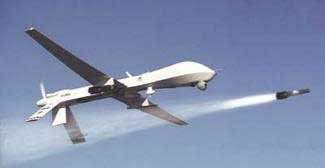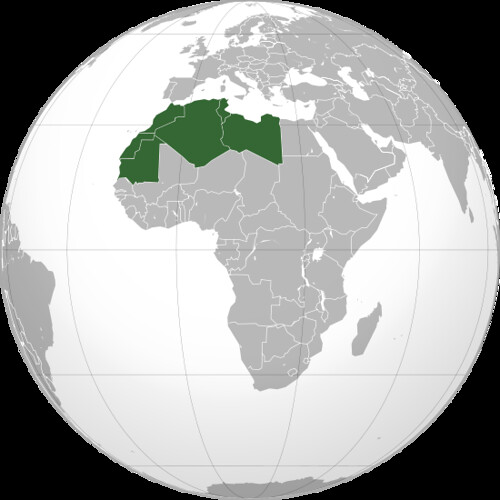 We are doing missile strikes in six countries and according to John Brennan, it is not going to stop any time soon.
We are doing missile strikes in six countries and according to John Brennan, it is not going to stop any time soon.
Afghanistan
Iraq
Libya
Pakistan
Somalia
Yemen
By Brigadier Lance Mans, Deputy Director, NATO Special Operations Coordination Centre [Public domain], via Wikimedia Commons
This is a secret program so how are we to know that there are not even more countries being targeted or plans or contingency plans for more?
I have a lot of questions and a lot of doubts and a deep sense of wrongness about all of this. I am certain that I am not the only one.
How many Americans realize that our Predator drones armed with Hellfire missiles are striking people in six countries? How many know that mistakes are inevitable and that we strike innocent civilians and even babies? No, that's not hyperbole, it's the truth, and it will continue to be the truth as long as we follow this path. How many Americans know that under the Obama administration we are doing more drone strikes than ever?
How can this possibly be right? How can it possibly be legal in a broad sense? How can it possibly reduce the number of potential enemies and terrorists? How can it possibly not increase the hatred toward our country and our people?
What kind of image do we create of the United States when our invisible Predator drones armed with Hellfire missiles are flying over their countries and could strike at any given moment?
Spencer Ackerman at Wired:
The harsh truth is that the Pakistanis can’t stop the drone war on their soil. But they can shift its launching points over the Afghan border. And the United States is already working on a backup plan for a long-term drone war, all without the Pakistanis’ help.
The Obama team’s new counterterrorism strategy should remove all doubt about the centrality of drones to a long-term fight against al-Qaida. That’s one of the main reasons it’s quietly negotiating with the Afghan government to keep a few residual bases jointly with Afghan troops after most U.S. forces leave.
A senior Obama aide explicitly told Danger Room last week that the intent is to host a “counterterrorism capability … a strike capability” on the bases “to ensure that there’s not that reemergence of a safe haven threat to us.”
Again, Spencer Ackerman:
White House: al-Qaida Is Toast (As Long As These Shadow Wars Last Forever)
Brennan said that doesn’t require a “global war.” But that’s semantic, if not laughable. He gestured at the “utter destruction” of al-Qaida affiliates not just in the Pakistani tribal areas sheltering its leadership but “the periphery, places like Yemen, Somalia, Iraq and the Maghreb.”
[ ... ]
But the biggest success the U.S. enjoys against al-Qaida isn’t the bin Laden kill or the drone strikes. It’s the Arab Spring, which leaves al-Qaida “on the sidelines, watching history pass them by,” Brennan said, reducing its ability to recruit or inspire new terrorists. [ ... ]
“Our best offense won’t always be deploying large armies abroad,” Brennan said. But Obama’s leaving one in place.
All this points to a big intellectual tension at the heart of the White House’s counterterrorism approach. Why does the U.S. still need to devote such overwhelming resources worldwide against a force that’s seeing history pass it by? [ ... ]And how does the U.S. know when al-Qaida has been “utterly destroyed”?
This is the Maghreb:

http://upload.wikimedia.org/...
Is the Arab Spring really "reducing its ability to recruit or inspire new terrorists" or are we creating more and more each day as people in six or more countries live in fear of invisible drones that might strike them at any given time?
In addition to his salient points about the morality of all of this, and the fact that this has not been aired or debated publicly, Eugene Robinson brings up an incredibly important point about the requirement for "near-perfect intelligence".
There is also a legal question. The Obama administration asserts that international law clearly permits the targeting of individuals who are planning attacks against the United States. But this standard requires near-perfect intelligence — that we have identified the right target, that we are certain of the target’s nefarious intentions, that the target is inside the house or car that the drone has in its sights. Mistakes are inevitable; accountability is doubtful at best.
http://www.washingtonpost.com/...
How likely is that that we will have "near-perfect intelligence" in the long-term and what types of surveillance systems, worldwide, would we have to have in place to achieve that "near-perfect intelligence"? I am thinking back about Guantanamo and the detainees and the very imperfect intelligence, and the more recent mistakes with drone stikes that hit restaurants and killed innocent civilians. Also, just in general, with all of the complexity in this world, what are the chances of having "near-perfect intelligence" in the short-term, let alone the long-term?
And what are the chances that this will spread to even more countries? In how many countries are we willing to engage in these covert wars in which we kill their citizens with missiles? How far will the world let this go? What will the criteria be that will determine whether or not we deem groups and individuals to be a drone-worthy threat?
Most of all, what will our image be going forward? In the past the United States has been a shining beacon. If this is our long-term strategy will we be seen as a shining beacon or a hellish predator?
Update:
Glen Ford really gives us something to think about in this paragraph in one of his recent articles:
Of course, national self-determination cannot exist in a world in which the U.S. and the Europeans claim the right to intervene whenever they identify some group, however vaguely defined, as endangered by the actions or inactions of the local government. Ellis has given a blank check to arbitrary global rule by U.S. military fiat – to endless wars that need no declaration, and to the end of international law as it has evolved over the centuries.


